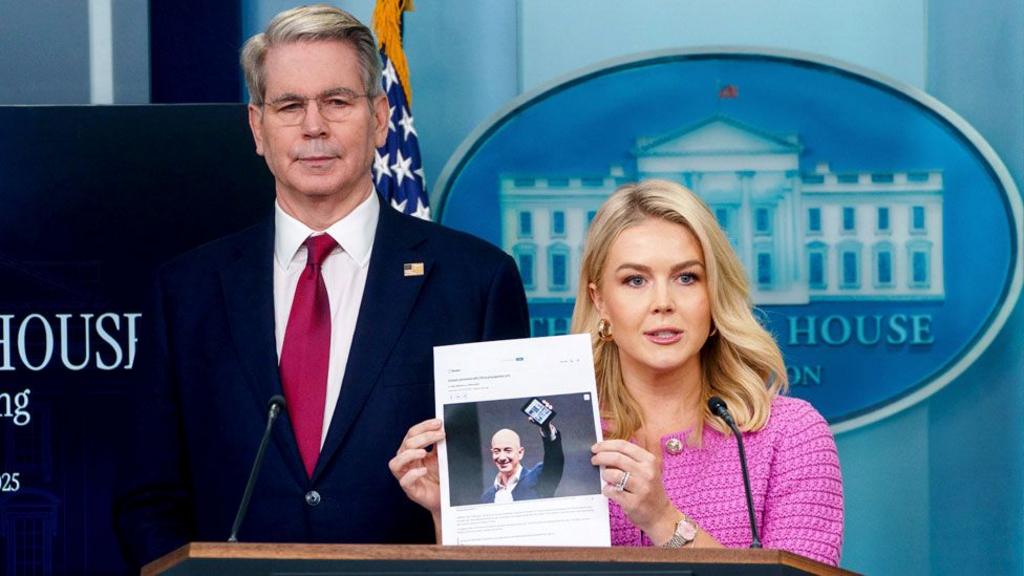US President Donald Trump contacted Amazon founder Jeff Bezos following reports that the retail giant was considering providing customers with a breakdown of trade tariff costs.
Amazon said it had evaluated the possibility of itemising tariff impacts for users of Amazon Haul, its budget-focused US platform launched last year as a rival to Shein and Temu.
The company clarified, however, that it ultimately opted against proceeding with the plan, stating that such a move had never been contemplated for its core marketplace.
The White House’s decision to respond forcefully to the report highlights mounting scrutiny over its updated import tax policies, which experts warn may result in higher consumer prices and heightened risk of recession.
During a news briefing commemorating President Trump’s first 100 days in office on Tuesday, Press Secretary Karoline Leavitt remarked that she had addressed Amazon’s reported intentions with the president, suggesting it underscored “one more reason for Americans to buy American.”
“This is a hostile and political act by Amazon,” Leavitt said. “Why didn’t Amazon act similarly when the previous administration presided over the highest inflation in 40 years?”
Since returning to office in January, President Trump has increased tariffs, asserting that these measures will strengthen domestic manufacturing and contribute to federal revenue.
Despite moderating some initial proposals this month, Trump’s policy changes have imposed new tariffs of at least 10% on numerous foreign imports, with Chinese goods subjected to rates of at least 145%.
These actions have led to a marked decline in bilateral trade between the US and China, raising concerns over potential supply disruptions and shortages of everyday items, such as baby strollers and umbrellas, for which China is a key supplier.
Some businesses have started clarifying the costs of tariffs to customers, with Shein and Temu—known for direct shipping from manufacturers in China—among those who have already announced price increases.
Analysts estimate that Chinese merchants account for roughly half of Amazon’s US-based sellers.
The potential initiative to outline tariff-related costs was first reported by Punchbowl News on Tuesday, citing an anonymous source.
Asked for clarification, Amazon spokesperson Tim Doyle confirmed the company had discussed adding import charge details for select Amazon Haul products.
“This was never approved and is not going to happen,” Doyle stated to the BBC.
A source familiar with the internal talks stated that they were prompted by the expiration of tariff exemptions on Chinese shipments valued below $800.
The source added that Amazon’s decision was unrelated to the White House’s remarks made on Tuesday.
When questioned by reporters about his conversation with Bezos, Trump said the billionaire, who stepped down as Amazon CEO in 2021, had “resolved the issue.”
“Jeff Bezos was very kind. He handled it swiftly and appropriately. He is a good person,” Trump commented.
Amazon was among several companies that contributed to the president’s inaugural celebrations, with Mr. Bezos occupying a prominent seat at the event.
Mr. Bezos, owner of The Washington Post, met with President Trump after the election and has previously expressed support for deregulation and tax reductions.
Nonetheless, the two have shared a historically tense dynamic.
During Trump’s initial term, he regularly criticised both Amazon and The Washington Post, while in 2016 Bezos accused Trump of engaging in rhetoric detrimental to democratic institutions, even jesting about sending the then-candidate into space.
In 2019, Amazon filed a lawsuit against the US Department of Defense, alleging that the company was denied a $10bn contract due to Trump’s “personal and political motivations” to disadvantage Bezos, whom he viewed as a political adversary.
Reporting by Bernd Debussman Jr.
Fifty years after the conclusion of the Vietnam War, the Southeast Asian nation is steadily advancing toward prosperity.
US President Donald Trump also spoke with Canadian Prime Minister Mark Carney following the general election in Canada.
Below is a curated selection of questions answered by our editorial team and correspondents.
After polls closed in Canada, Mark Carney told the BBC there is potential for US-Canada cooperation, but “on our terms.”
President Trump said the policy would provide relief to automakers as they adapt their supply chains.

